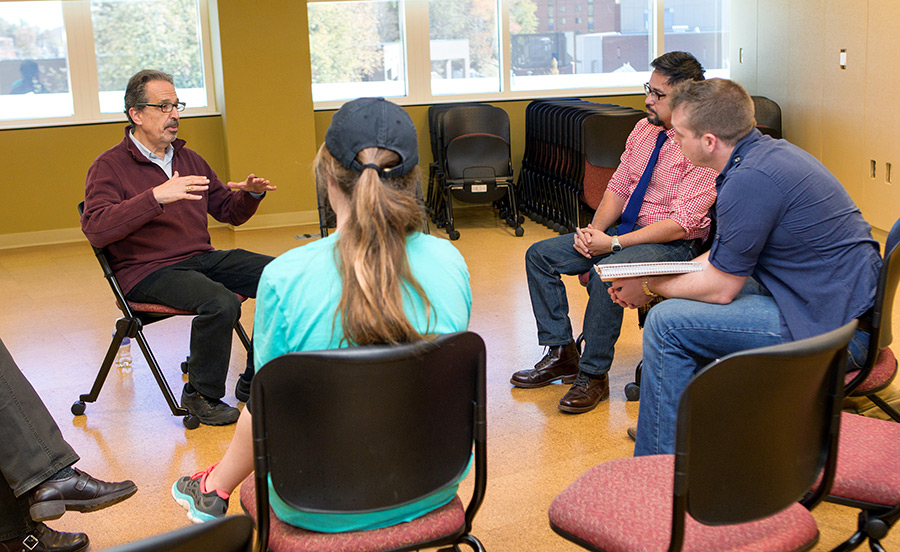BOONE—Technology devices can be powerful tools, but they also can distract us and contribute to a machine-like culture that often brings dissatisfaction to our lives, according to Dr. David Levy, who visited Appalachian State University as the 2015 Belk Distinguished Lecturer.
But choosing to use technology in a mindful way can lessen distraction and help students and others make conscious choices about how they spend their time, he said.
“We are expected to go faster and consume more. Reflective and contemplative time is considered unproductive,” said Levy, a professor in the Information School at the University of Washington (UW) in Seattle who specializes in the intersection of technology and contemplative practices.
On the contrary, Levy said taking time for reflection can be highly useful. He recommended pausing for a “mindful check-in” when using technology. Take note of your breathing (Am I breathing? Is my breathing shallow or deep?), physical sensations (How is my posture? Am I comfortable or uncomfortable?) and emotions (Am I happy or sad?). This 5-minute or less activity can strengthen what he called “the attention muscle.”
“I’ve been investigating how contemplative practices in life can help us be healthier, more effective, ethical and connected,” he said.
By paying attention to what our body and emotions tell us, “it gives us choices, and the more we watch the way we make choices, the more over time we learn how to make choices,” Levy said.
For example, students who become distracted from writing a paper by watching videos on the Internet might consider what pulled them away from their writing in the first place – perhaps they are avoiding the feeling of being stuck. Setting an intention to write for a certain amount of time can help avoid such distraction, he said.
Doing a mindful check-in frequently “can make us more responsible to ourselves, each other and how we respond to the world,” he said.
Among the exercises he recommends for UW students taking his course titled Information and Contemplation is “focused email”: when checking email, every time the mind wonders or a dinging app draws attention away from the task at hand, choose to return your attention to the email. Being conscious of one’s behavior in this way can help people use technology devices to their advantage and not become driven by them, he said.
During his Appalachian visit, Levy delivered a public lecture and met in small groups with students, library staff, deans and members of Still Point, the faculty/staff organization dedicated to exploring contemplative pedagogy and practice in higher education.
Levy’s forthcoming book, “Mindful Tech: How to Bring Balance to Our Digital Lives,” will be published in early 2016 by Yale University Press.
Levy’s visit was part of Belk Library and Information Commons’ Carol Grotnes Belk Distinguished Lecture Series. Irwin and Carol Belk of Charlotte have provided funding for the series through the library’s Carol Grotnes Belk Distinguished Professorship.
About Appalachian State University
As a premier public institution, Appalachian State University prepares students to lead purposeful lives. App State is one of 17 campuses in the University of North Carolina System, with a national reputation for innovative teaching and opening access to a high-quality, cost-effective education. The university enrolls more than 21,000 students, has a low student-to-faculty ratio and offers more than 150 undergraduate and 80 graduate majors at its Boone and Hickory campuses and through App State Online. Learn more at https://www.appstate.edu.
What do you think?
Share your feedback on this story.





![How NCInnovation Is Rethinking Economic Development in North Carolina [faculty featured]](/_images/_posts/2026/02/rethinking-economic-development-600x400.jpg)






